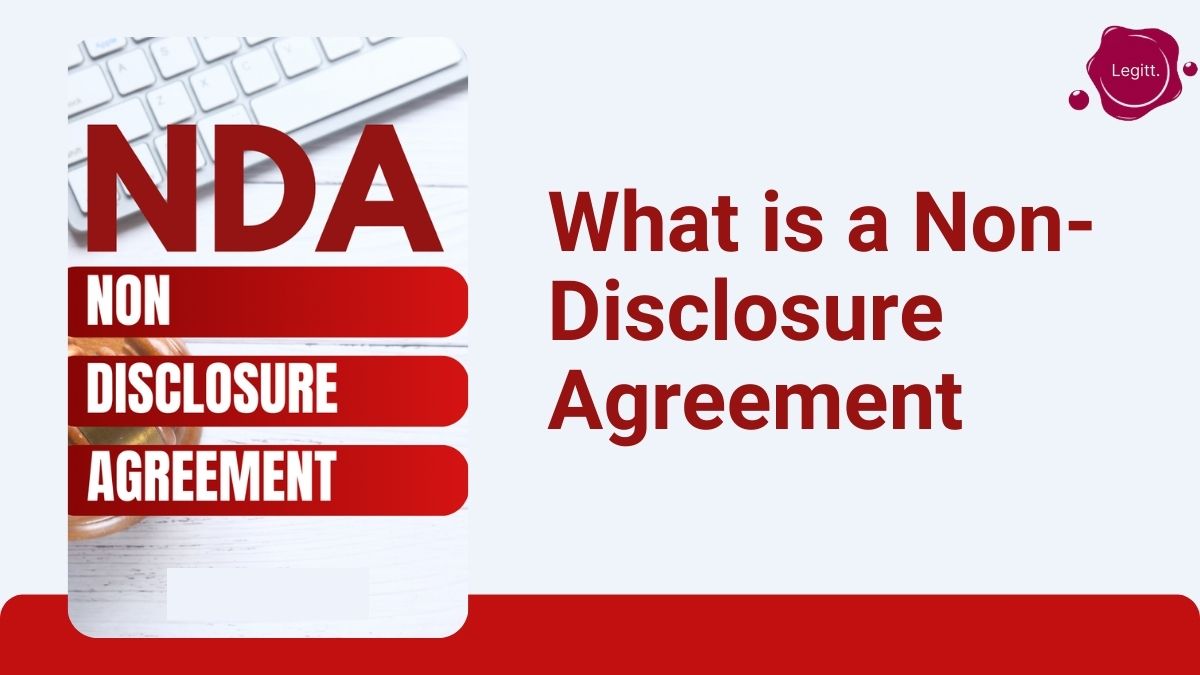In this post, we try to explore what is the definition of NDA and what key elements of an NDA mean.
Non-Disclosure Agreement is one of the most widely used contracts in the world of business. Although there are multiple types of NDAs signed for different types of engagements, the general definition of NDA remains same. In this post, we try to explore what is the definition of NDA and what key elements of an NDA mean from a lay-man’s perspective.
As per definition, “a contract by which two or more parties agree not to disclose confidential information that they have shared with each other as a necessary part of doing business together”.
Read More: How to Create an NDA between an Employer and an Employee
This might be a lot of information packed in a single sentence, but if one breaks the parts and tries to analyse, it gives us everything that we need to understand what is a Non-Disclosure Agreement, or simply, the NDA.
“a contract” – An NDA is a contract. A contract is a legally enforceable agreement. And, an agreement must have more than one party to it. So, this means A contract is a legally binding agreement between two or more parties. The most important part here is the legal binding. Which means, if the contract is broken by any of the parties, the other party can take the matter to court.

Quick NDA Creation with Legitt AI
Instantly draft a precise NDA using Legitt AI. Secure your sensitive data with ease.
Get Started Free“agree not to disclose” – This is one of the most important parts of the NDA. The parties entering the contract agree not to disclose the information to anyone else. This is important in the case where your team or other partners have to access that information. Unless it is mentioned in the NDA, you cannot share the information even with your team members or partners. In case you have to share the information with your team, it has to be mentioned in the NDA.
Read More: How To Write a Non-Disclosure Agreement
“confidential information” – This is again a very important part of the definition. Every organization has one set of information that is public and then another set of information that is private/confidential. The NDA applies only to the confidential information of the party. Even if you have signed the NDA, you are only constrained to share the confidential information.
“shared with each other” – In the confidential information, the NDA applies to the information shared between the parties. This means, you can access only the shared information. In case, by any means, you have access to any other confidential information that is confidential, you can still face legal action.
“necessary part of doing business” – Although this part of the definition is fairly easy to understand, but one has to keep in mind that this shared information can be used only for the current business engagement under discussion. It cannot be applied to any other engagement with the same party, without the two parties consenting for the same.
Read More: Vendor Non-Disclosure Agreement
So, at a high level, an NDA is a legally binding agreement signed between parties to restrict the use of information being shared between the parties to only specific use cases or engagements.
If you run a business that enters into NDAs with other parties and are not sure if you are generating NDAs with correct information, you can create NDA using Legitt. Also, you can explore different templates of NDAs here.
Some of the commonly used NDAs are:
- General NDA. You can read more about general NDAs here
- Employer-Employee NDA. You can read more about NDAs signed between employee and employer here
- NDA signed between a company and a vendor or a service provider. You can read more about NDAs signed between a company and its vendor/service provider here
- NDA signed between a company and a contract worker. You can read more about NDAs signed between a company and its contract workers here
- NDA signed between a company and a client. You can read more about NDAs signed between a company and its client(s) here.
As a business besides the NDAs you would be signing a lot of other legal documents if you are searching for additional legal documents that you may be signing as a business you can explore them here.
FAQs on NDA
What is the definition of an NDA?
An NDA, or Non-Disclosure Agreement, is a legally binding contract where two or more parties agree not to disclose confidential information shared during a business engagement.
What are the key elements of an NDA?
The key elements of an NDA include the contract itself, the agreement not to disclose, the definition of confidential information, the parties involved, and the business context in which the information is shared.
Is an NDA legally binding?
Yes, an NDA is a legally enforceable agreement. If any party breaches the contract, the other party has the right to take legal action.
What does 'confidential information' mean in an NDA?
Confidential information refers to private or sensitive data that is not meant for public disclosure, such as trade secrets, financial records, or business strategies.
Can I share NDA-protected information with my team?
Only if the NDA explicitly permits it. Otherwise, sharing confidential information with anyone-including team members—may be a breach of contract.
Who should sign an NDA?
Any individual or organization that is part of a business transaction involving the exchange of sensitive information should sign an NDA to protect both parties.
When should a business use an NDA?
Businesses should use NDAs when dealing with vendors, employees, contractors, clients, or potential partners to protect confidential information during collaborations or negotiations.
Are there different types of NDAs?
Yes. Common types include General NDAs, Employer-Employee NDAs, Vendor NDAs, Client NDAs, and Contractor NDAs—each suited for different business relationships.
Can an NDA cover multiple projects or engagements?
Not by default. Most NDAs are specific to a particular business purpose. To use the NDA for multiple engagements, both parties must agree and update the terms accordingly.
How can I create an NDA quickly and accurately?
You can instantly create a legally sound NDA using platforms like Legitt AI, which offers customizable templates and AI-powered drafting to ensure compliance and clarity.
